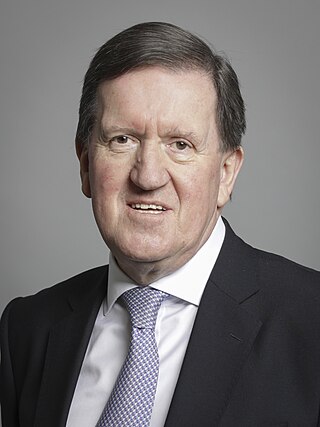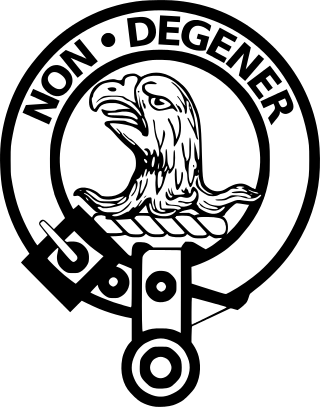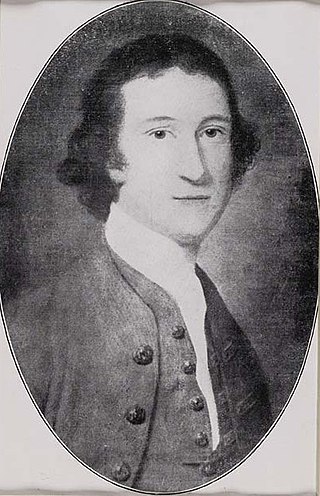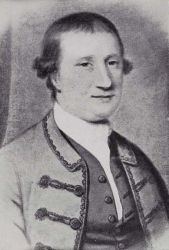
George Islay MacNeill Robertson, Baron Robertson of Port Ellen, is a British politician of the Labour Party who was the 10th Secretary General of NATO from 1999 to 2003; he succeeded Javier Solana. He was Secretary of State for Defence from 1997 to 1999, before becoming a life peer as Baron Robertson of Port Ellen, of Islay in Argyll and Bute, on 24 August 1999.

Earl of Dundee is a title in the Peerage of Scotland. It was created in 1660 for John Scrymgeour, 3rd Viscount Dudhope. At his death in 1668, the Duke of Lauderdale declared that the first Earl had no heirs-male, and had the crown seize all of his lands. The earldom of Dundee became dormant and its holdings and offices were granted to Charles Maitland, 3rd Earl of Lauderdale, the Duke's younger brother. The title was revived in 1953, when it was determined that the first Earl did indeed have heirs-male, contrary to the assertion of the crown. The title was given to Henry James Scrymgeour-Wedderburn, who had previously served in the House of Commons and in the Cabinet.

Alison Louise Kennedy is a Scots writer, academic and stand-up comedian. She writes novels, short stories and non-fiction, and is known for her dark tone and her blending of realism and fantasy. She contributes columns and reviews to European newspapers.

William Angus McIlvanney was a Scottish novelist, short story writer, and poet. He was known as Gus by friends and acquaintances. McIlvanney was a champion of gritty yet poetic literature; his works Laidlaw, The Papers of Tony Veitch, and Walking Wounded are all known for their portrayal of Glasgow in the 1970s. He is regarded as "the father of Tartan Noir" and as Scotland's Camus.

Joseph Knight was a man born in Guinea and there seized into slavery. It appears that the captain of the ship which brought him to Jamaica there sold him to John Wedderburn of Ballindean, Scotland. Wedderburn had Knight serve in his household, and took him along when he returned to Scotland in 1769. On Knight leaving his service, Wedderburn had him arrested and brought before the local justices of the peace. Inspired by Somersett's Case (1772), in which the courts had held that slavery did not exist under English common law, Knight resisted his claim. Knight won his claim after two appeals, in a case that established the principle that Scots law would not uphold the institution of slavery.

James Kelman is a Scottish novelist, short story writer, playwright and essayist. His fiction and short stories feature accounts of internal mental processes of usually, but not exclusively, working class narrators and their labyrinthine struggles with authority or social interactions, mostly set in his home city of Glasgow. Frequently employing stream of consciousness experimentation, Kelman's stories typically feature "an atmosphere of gnarling paranoia, imprisoned minimalism, the boredom of survival.".
Andrew Colvile was a Scottish businessman, notable as the governor of the Hudson's Bay Company, a huge organisation set up for the North American fur trade but also instrumental in the early history of Canada. He was also chairman of the West India Docks.
Meaghan Delahunt is a novelist. She was born in Melbourne, Australia and now lives on the East Coast of Scotland. In 2004 she was Writer in Residence in the Management School at St Andrews University, and she now lectures in Creative Writing at the University of Stirling.
Slavery at common law in the British Empire developed slowly over centuries, and was characterised by inconsistent decisions and varying rationales for the treatment of slavery, the slave trade, and the rights of slaves and slave owners. Unlike in its colonies, within the home islands of Britain, until 1807, except for statutes facilitating and taxing the international slave trade, there was virtually no legislative intervention in relation to slaves as property, and accordingly the common law had something of a "free hand" to develop, untrammelled by the "paralysing hand of the Parliamentary draftsmen". Two attempts to pass a slave code via Parliament itself both failed, one in the 1660s and the other in 1674.
James Robertson is a Scottish writer who is the author of several novels, short stories and poetry collections. Robertson was born in Sevenoaks, England but grew up in Bridge of Allan, Stirlingshire. He has published seven novels: The Fanatic, Joseph Knight, The Testament of Gideon Mack, And the Land Lay Still, The Professor of Truth, and To Be Continued… and News of the Dead. The Testament of Gideon Mack was long-listed for the 2006 Man Booker Prize.

Andrew Crumey is a novelist and former literary editor of the Edinburgh newspaper Scotland on Sunday. His works of literary fiction incorporate elements of speculative fiction, historical fiction, philosophical fiction and Menippean satire. Brian Stableford has called them "philosophical fantasies". The Spanish newspaper El Mundo called Crumey "one of the most interesting and original European authors of recent years."

Clan Wedderburn is a Lowland Scottish clan.
Petersfield is a small town in Westmoreland Parish, Jamaica. It shares its name with five other places in Jamaica.

The Wedderburn, later Ogilvy-Wedderburn Baronetcy, of Balindean in the County of Perth, is a title in the Baronetage of the United Kingdom created in 1803.

Inveresk Lodge Garden is in the care of the National Trust for Scotland, in the village of Inveresk, East Lothian. The lodge lies about 10 km south-east of Edinburgh, and for over a century was one of the homes of the Wedderburn family.

Sir John Wedderburn of Ballindean, 6th Baronet of Blackness (1729–1803) was a Scottish landowner who made a fortune in slave sugar in the West Indies. Born into a family of impoverished Perthshire gentry, his father, Sir John Wedderburn, 5th Baronet of Blackness, was executed for treason following the Jacobite uprising of 1745, and the young Wedderburn was forced to flee to the West Indies, where he eventually became the largest landowner in Jamaica. In 1769 he returned to Scotland with a slave, one Joseph Knight, who was inspired by Somersett's Case, a judgment in London determining that slavery did not exist under English law. Wedderburn was sued by Knight in a freedom suit, and lost his case, establishing the principle that Scots law would not uphold the institution of slavery either. Wedderburn ended his days as a wealthy country gentleman, having restored his family fortune and recovered the title Baronet of Blackness.

Sir John Wedderburn, 5th Baronet of Blackness, (1704–1746) was a Perthshire gentleman who joined the 1745 rebellion of Charles Edward Stuart. He was captured at the Battle of Culloden, taken to London, and convicted of treason. He was hanged, his estates were forfeit to the Crown, and his family was attainted. The Blackness in his title is Blackness House in Dundee rather than Blackness in Lothian just west of Edinburgh. His son John Wedderburn of Ballindean fled after his father's death to Jamaica, where he re-established the family's fortunes via slave sugar, and eventually regained his father's title.
Events from the year 1937 in Scotland.
Sir David Wedderburn, 1st Baronet was a Scottish businessman and Tory politician. He was Postmaster General for Scotland 1823-31 and a member of two London militias before that.
James Wedderburn-Colville (1739-1807) was born James Wedderburn, the second son of Sir John Wedderburn, 5th Baronet of Blackness, an impoverished Perthshire gentleman who was executed following the Jacobite rising of 1745. Following his father's death, James travelled to Jamaica where, like his brother John Wedderburn, he made a fortune in the sugar trade. In 1773, he returned to Scotland where he married the heiress Isabella Blackburn in 1774, and purchased a country seat at Inveresk Lodge; raising a family of six children. In his later years, Wedderburn lived the life of a country gentleman until his death in 1807.












